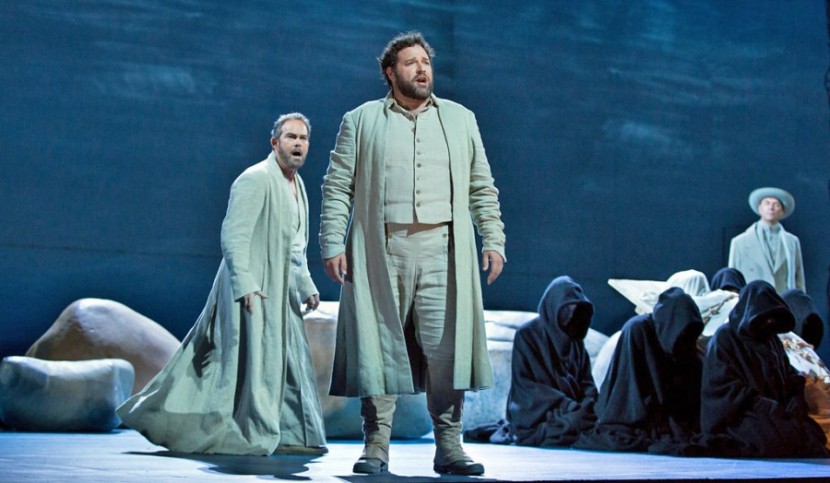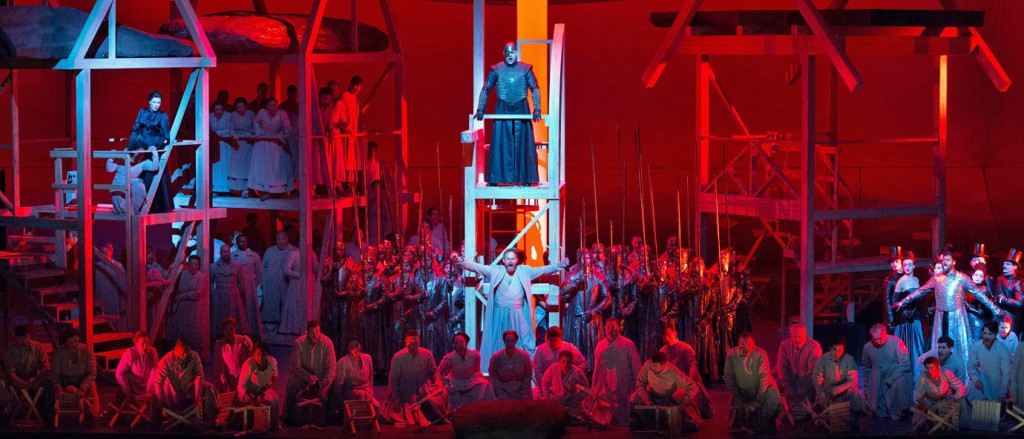
Guillaume Tell (William Tell) by Gioachino Rossini. Metropolitan Opera, New York.
Everyone knows the overture to Rossini’s William Tell, thanks to the Lone Ranger with its narration: “From out of the past come the thundering hoofbeats….” although that famous galloping melody does not appear in the opera itself, only in the overture. Few people, however, have seen the opera.
Tell is a neglected major work, not performed at the Metropolitan since 1931, and never before sung there in the original French.
The new production is impressive, mostly for the choral music and for the tenor singing of Bryan Hymel. While the title role is for a baritone (in this case, Gerald Finley) that character has no stand-alone aria. Finley is an appealing singer and actor. But the tenor character of Arnold, a Swiss patriot, is much more prominent.
Hymel electrified the house with the opera’s big number, Asile héréditaire, where he laments his father’s death, and with its follow-up fast-tempo cabaletta where he swears vengeance. He excelled in two romantic duets with Latvian soprano Marina Rebeka, who played Mathilde, the sister of the commander of the occupying Austrians.
Hymel’s heroic dominance with ringing tones brought to mind the young Luciano Pavarotti, who became known as King of the High Cs when he belted nine of those notes in Donizetti’s The Daughter of the Regiment.
In this William Tell, Hymel sang 22 high Cs and two C-sharps. He also revealed authentic French placement and resonance. More than anyone else in the excellent cast, he created a glowing sound that seemed to radiate from behind his cheeks and nasal passages in the French fashion, rather than from “the mask” between the eyes, as with Italian singing, or from the throat or chest in German and Russian.
That’s surely is attributable to Hymel’s coaching during four years at the Academy of Vocal Arts in Philadelphia, possibly abetted by his upbringing in the French-speaking culture of Louisiana.
This a significant factor because Rossini had moved to Paris in 1824, five years before he wrote William Tell, and immersed himself in the French culture. With this composition he made an intentional shift from bubbly Italian romantic comedies to a new style of French-language drama that influenced Halevy (La Juive) and Meyerbeer (Les Huguenots and Le prophète) a few years later.
Much of Rossini’s writing is declamatory rather than in the composer’s familiar, decorative style. It is quite revealing to hear how different this Rossini work is. Much of the instrumentation is innovative and very appealing. And it’s frustrating that the man did not write any more operas in this new fashion.
The story concerns the Swiss longing for liberation from the cruel Austrian occupation led by the villainous governor Gesler (John Relyea). Action is static during the opera’s nearly five hours, while choral music repeatedly extols sunsets and pastures and high Alpine peaks; then, in the finale, a paean to liberte.
Janai Brugger in the role of Tell’s young son revealed a wonderfully rich voice and excellent command of French style. Maria Zifchak was a strong presence as Tell’s wife, Hedwige. Marina Rebeka did some beautiful Italianate singing as Mathilde. She phrased gracefully but didn’t mesh stylistically. All of the low-voiced males did nicely: John Relyea, Marco Spotti as Walter Furst and Kwangchul Youn as Melcthal.
George Tsypin’s sets and Pierre Audi’s staging were allegorical rather than realistic, with white fluorescent light tubes representing trees. Blinding white skies alternated with darkness in an obvious effort to pictorialize the struggle for bright freedom over dark tyranny. While the production was visually inert, it was musically fascinating.
Fabio Luisi led the orchestra in a refined, lyrical performance; it will be almost impossible to match his propulsive energy when he departs from the Met. Donald Palumbo’s chorus sang magnificently.
An earlier version of this review appeared in The Broad Street Review.
Below, one of the production’s crowd scenes:
